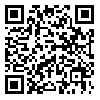Volume 20, Issue 81 (2023)
LIRE 2023, 20(81): 35-42 |
Back to browse issues page
Download citation:
BibTeX | RIS | EndNote | Medlars | ProCite | Reference Manager | RefWorks
Send citation to:



BibTeX | RIS | EndNote | Medlars | ProCite | Reference Manager | RefWorks
Send citation to:
Fathollahi S, Zabihnia Emran A, Poshtdar A M. The Study of Shahrnush Parsipour’s “Touba and The Meaning of the Night” on the Basis of Erving Goffman’s Theory of Stigma. LIRE 2023; 20 (81) :35-42
URL: http://lire.modares.ac.ir/article-41-66345-en.html
URL: http://lire.modares.ac.ir/article-41-66345-en.html
1- , sfath@student.pnu.ac.ir
Abstract: (476 Views)
This paper aims to study Shaharnush Parsipour's novel Touba and the Meaning of the Night" (1368) in the framework of Erving Goffman's theory of Stigma: Management of Spoiled Identity (1963). This theory examines the relationship between people in daily life. This novel narrates the life of Touba from the late Qajar to the Pahlavi period. While using an anthropological approach, the present descriptive-analytical research tries to answer which themes of Goffman's Stigma are more prominent in the novel regarding Touba, who narrates the story. The results indicate that the novel's most important stigmas and labelings are feelings of anonymity or loss of identity, disgust, rejection, anti-currentism, social dissent, and doubts about Touba's character, which often has a psychological and cultural basis. The disrespect, hesitation, ominous feeling of destiny, insecurity, obsession, and inferiority complex, and consequently, the arousal of hatred and revenge surrounded Touba more than anything else.
Keywords: Shahrnush Parsipour, Touba and The Meaning of the Night, Erving Goffman, Persian contemporary novel, Analysis Goffman's theory of Stigma
Article Type: مقالات علمی پژوهشی |
Subject:
Contemporary Literature/ Story / Novel
Received: 2021/06/26 | Accepted: 2022/01/29 | Published: 2023/09/1
Received: 2021/06/26 | Accepted: 2022/01/29 | Published: 2023/09/1
Send email to the article author
| Rights and permissions | |
 |
This work is licensed under a Creative Commons Attribution-NonCommercial 4.0 International License. |









